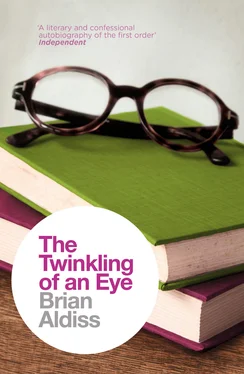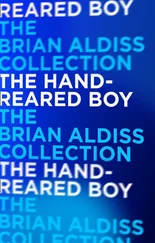From then on, this sneering bully was always about, always leering at me. Salt in the wound was that his first name was the same as mine. I hated his stupid face, his staring eyes, his winks and jeers, and would have killed him if I could. But he was twice my weight.
That first loathing of homosexual acts remained with me. Rather worse, it left me with a distaste for the flesh for some years.
Perhaps my story-telling in that dorm, at which I became so successful, protected me from further insults of the kind.
So Betty and I played light-heartedly in the rock pools, while time and tide dawdled. It did not bother us that we knew no one else in the world. The sun dazzled on the water, the little crabs scuttled at the bottom of our rubber buckets. We cared as greatly for the events in Europe – the Panzers, the sabres, the fruitless cavalry charges, the Stukas – as did the crabs.
Noon on 3 September. The summer had crumbled away, along with peace. Britain and France declared war on Nazi Germany, only twenty-one years after the last war had run its course. Dot was preparing lunch in our new caravan. Bill and I stood with our neighbour, outside his caravan, where his large wife was frying up. Neville Chamberlain’s voice mingled with the gurgle of sausages wallowing in their fat.
I see it all as if it were a photograph. The world has faded to sepia, along with much else. I described the scene in my novel Forgotten Life . Fiction is often the best medium for such drama, when momentous and meagre clash.
At that solemn time, with Britain plunging ill prepared into war, I went about in a state of sin, secretly rejoicing, I don’t have to go back to bloody Framlingham! May all those bastards there rot! Thank you, God, thank you, Hitler!
That night, we blacked out the tiny square window in the caravan roof, some with fury, others with shrieks of laughter which served to ripen the adult anger.
We woke on the 4th and went running out across the green while breakfast was prepared. There was the wonderful view, the sea, the cliffs, the white cottage. Sheep grazed by the wheels of our car. Wartime!
We were to all intents and purposes homeless. Bill drove into Bude, to return with a key. A bungalow stood empty on the cliffs just above Widemouth. We went to look it over with a builder. Bill was agreeing to rent it by the month, Dot was chirping with pleasure.
Betty danced in the empty rooms. Bill shouted, ‘Come here! Behave!’ Sunlight poured through the front windows. The bungalow was unfurnished, as neat as new, and bereft of everything except a copy of Fantasy , lying alone on a window seat.
On the cover of that 1939 issue, Fantasy: A Magazine of Thrilling Science Fiction , was an imaginative painting of fire engines drawn up in the centre of London, in Piccadilly, fighting off giant caterpillars with jets of plaster of Paris. In a year’s time, the brigades would be dealing with another kind of invasion from the sky.
We moved into the bungalow behind Widemouth cliffs. A few sticks of furniture were bought in Bude. Autumn held its breath: days remained calm and brassy. Looking out of the window at the Atlantic as the sun went down, Bill would say over the frugal supper table, ‘It’s been a lovely day.’ His aggrieved tone comes back to me. ‘ It’s been a lovely day .’ On the horizon, black against the sinking sun, our first convoys – those convoys in which I would one day find myself – were setting out for foreign waters. The weather remained too calm for war to be real.
As that ominous season advanced towards winter, the bungalow crouching near the cliffs became more isolated. Over Bill fell a mood of hopelessness. The whitewashed store on the bay closed its shutters. Cars ceased to run along the coast road. Betty and I wandered about the strange wild place, among the gorse, imitating the shrieks of the seagulls overhead, much as Wordsworth’s boy ‘blew mimic hootings to the silent owls, That they might answer him’.
The wet Cornish season closed in. Rain pelted down, rushing to get to the centre of the earth. And when the rain abated, the Atlantic became angry, dashing with such force against the rock below the cliffs that spindrift cracked smartly against our window panes, gust after gust.
Before I was installed in a second public school, Bill and I made what I regarded as an epic journey. Setting out at four in the morning in our Rover, he and I, we drove all the way to Gorleston. It was dark when we started out from Widemouth. Roads had no cats’ eyes in those days. Our headlights were dimmed to meet blackout regulations. We arrived at the house in Bernard Road at about midday.
The Boxbaums had gone from next door. Their house, like others in the road, was closed up. A forsaken dog wandered loose in the street; Dennis Wheatley’s alarming novel Black August came to mind, like a vision of the near-future fulfilled. I still wonder what happened to the Boxbaums, in particular to that girl with the blue Aegean eyes. No doubt the Jewish community took care of them.
Bill packed everything into crates, in preparation for a removal firm to come and the house to be sold up for next to nothing. Nobody wanted to live on the east coast now. I helped him – or perhaps hindered, because he told me to take a walk and look at the sea. I made my way down to the front, where Betty and I had spent our most halcyon days.
In the few weeks of our absence a great change had overcome the town. The bandstand was locked, ‘for the duration’, as the saying went. Everything looked forlorn, with a more-than-mid-winter desertion about it. The lovely stretches of sand were empty. The shops we knew were almost all shut down; some had boarded up their windows with improvised shutters. Barbed wire was being unrolled along the promenade.
Bill and I started back to Cornwall before nightfall with Dot’s canary in its cage on the back seat. The canary sang all the way home. Retrieved from the neighbour, Tiny also accompanied us.
Two events on the journey remain in mind, my tongue-tied awe at being alone with my father at close quarters, and our stop for a cup of tea and cake in Oxford – my first sight of that venerable city. I was excited, and not only at the prospect of tea. The waitresses in the St Giles Café were so slow in coming to serve us that Bill, never a patient man, walked out after a minute or two. I perforce followed.
That was the last I saw of Oxford for ten years.
When I was sent to my new school on the fringes of Exmoor, Bill set about finding work. His nest egg from Dereham looked less generous now. He and Dot drove a long way in search of a viable property. He had always been good at property deals, but the war made values uncertain. A newsagent’s shop in Chard, Somerset attracted him. There was something in Wincanton. Mother liked the idea of a tearoom. Or perhaps a shop in Exeter?
Exeter had many beautiful old features. Some narrow streets were medieval, resembling the Shambles in York. A particularly interesting book shop stood beside the cathedral. Life continued there as normal; how else? Except that some public buildings were fortified by walls of sandbags.
At first, I hated West Buckland. The grounds on which the school stands were donated by a local landowner, the Second Earl Fortescue, in the 1850s. The Fortescue family still live near by and maintain their friendly connection with the school. WBS consists of a series of stone buildings, not unlike a prison in appearance (in the manner of most public schools), well suited to the rather bare landscape in which it was planted. The quads were of an amazing draughtiness, as the wind howled in from the Atlantic, past Morte Point, bouncing over Fullabrook and Whitefield Downs, clowning its way across the Seven Sisters, to arrive in time for morning parade outside the headmaster’s offices.
Читать дальше












